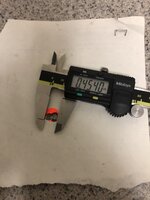That’s just denying science, isn‘t it? You are shooting an accurate 100 yd load with 5 different drops at 1000 yds. Won’t just the drop variation take the group to 20+ inches?
Are we talking actual “science”, or we talking “The Science

“?
Yes, velocity variation has an effect. However, if your high round count groups (10+) are acceptable size at whatever your distance is, why does it matter what your SD/ES is? In other words if you are grouping at distance, than the grouping is taking care of the variation. If you’re doing endless load playing at 100 yards, you’re just hoping that small SD/ES translates to small groups at range.
To that point though, all guns that I can remember that have grouped well for high round counts at 100, have done so at 300, which have done so at 800.
@Formidilosus , do you ever anneal your brass or do you just shoot it a few times and toss them?
Not really. By the time annealing comes in, the barrels shot out or the brass is lost. 3-4 firings and I’m generally done with it for whatever reason. I don’t get into the psycho brass hording thing either
Haha no. I like measuring speeds because I enjoy screwing with the numbers. I won't ever shoot at game passed 4-500 so spreads don't make a real difference to me.
I was just trying to make a point that if you're shooting a long way out there, spreads will matter at some point.
Sure they will, but not like a lot of people believe. We miss due to the largest source of error. Or I should say our hit rate is determined by the largest sources of error. Rarely (almost never?) is that velocity ES outside of a benchrest. Dudes aren’t missing due to an ES of 30 versus an ES of 10. They’re missing due to not calling wind correctly, flinching, incorrect zero, loss of zero, optic not tracking, poor positional shooting ability, etc, etc.
What’s the consensus on velocity “flat spots” anyways? Anyone schooled up in stats knows that 1-3 rounds at each charge isn’t a very good sample size. The guys that only shoot one round per charge and call it a flat spot kind of baffle me.
From what I’ve seen it can be real, but people are kidding themselves by doing so with one round. It’s the same BS about getting velocity SD or ES off of 5-10 rounds. That’s just a joke.
@Formidilosus thanks for the summary. It's a refreshing look at reloading.
2 questions. You stated that this rifle only needed to be accurate within 1.0 to 1.1 MOA. How do you decide on that requirement?
Hit rate for the task. The target is deer sized game out to 800m. So a 12” target at 800m. That is calculated with Applied Ballistics WEZ. Putting all variables in, reducing groups size below that has a very marginal effect on hit rate in the field, but a very large time and component cost.
How do you decide on a Ballistic Coefficient? Especially considering most manufacturers are known to inflate their numbers.
There’s enough work for correct BC numbers now that if AB, Hornady, etc. put it out then it’s very close generally and closer than one can measure just by shooting.
Why do you choose to keep BC static and then adjust velocity. If I have a decent chrono and can obtain reasonably reliable data from that, why wouldn't you adjust BC... which in my head seems like a greater unknown as so many things can affect BC.
How are you sure your velocity is completely correct? I would not trust a chrono average with less than 30 shots back to back. How do you know your adjustments are tracking at exactly .1 Mil or .25 moa for the entire range you use it at? Do you know that the scope does so with live rounds through recoil instead of just static texting? How do you know that you don’t have a slight updraft or down draft on the way to the target?
Point being that it takes relatively large variations in BC to make considerable changes to elevation inside of terminal ranges (1,800’ish FPS for an average), yet relatively little MV error to create the same elevation change. Biggest spruce of error= MV, not BC for any good bullet. Now if you’re shooting bullets with widely inflated BC’s (looking at you Hammer), then yeah, everything is kind of a guess. But much like shooting Tikka/Sako, I skip all the nonsense and drama by shooting bullets that are known performers.
Even with all that, the base reason I generally adjust MV and not BC is because it works. I have zero issues zeroing, trueing at distance, and then going anywhere in the country and getting first round, elevation correct impacts doing so, without ever chronoing the gun/ammo. I’m not into the dork crap- the gun is a means to an end, not the end, and I want the path that gets me to that end the quickest and surest.

